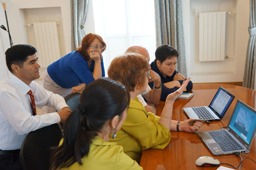Advanced Health Information Workshop in the Russian Federation

WHO
The Advanced Health Information Workshop took place on 29 June–3 July 2015 in UN House, Moscow, Russian Federation. This technical meeting was organized in response to a request to the Regional Director from participants of last year's Autumn School on Health Information and Evidence for Policy-making.
The workshop brought together 35 representatives of Member States in the WHO European Region – mostly from the Commonwealth of Independent States (CIS) countries but also from Albania, Serbia and Turkey – WHO staff and leading international experts.
Participants discussed:
- the European Health Information Initiative (EHII);
- country updates on health information issues;
- the WHO Family of International Classifications and the International Classification of Diseases (ICD);
- Iris software for coding multiple causes of death and the selection of underlying cause of death;
- WHO standards and tools for collection and dissemination of cause-of-death data;
- quality check of data using the "analysing mortality level and cause-of-death" (ANACoD) tool; and
- health inequality monitoring and health equity assessment.
The workshop consisted of lectures and practical hands-on exercises in which participants learned to apply the tools and techniques using their own data. Group work and presentation of results further enhanced the learning experience. By the end of the workshop, participants mastered new practical tools and techniques they could immediately apply in their national setting. Participants praised the hands-on format of the workshop, and several country representatives stated that they would use the tools and methods immediately. Evaluation of the workshop confirmed a very high degree of satisfaction.
EHII and engagement of the Russian Federation
Dr Claudia Stein, Director, Division of Information, Evidence, Research and Innovation at WHO/Europe, informed participants about EHII, a multimember WHO network committed to enhancing the health of the people of the European Region by improving health information. The EHII Steering Group, which is supported by 11 Member States, is co-chaired by the Netherlands and the Russian Federation. EHII's main aim is to support the development of a single, integrated health information system for the entire European Region, which can be achieved by activity in 6 key areas:
- development of indicators for health and well-being
- enhanced dissemination of health information
- capacity building
- strengthening of health information network
- support for the development of health information strategy
- communication and advocacy.
The Russian Federation is involved in all of EHII's activites and has co-chaired the special working group, which developed the support tool to enhance health information strategies, a key element of EHII. The involvement in EHII demonstrates the key leadership role that the Russian Federation plays in developing health information in the Region.
The joint WHO-Russian Federation project "Enhancing the use of Russian through translation of WHO publications" started in 2012 and is successfully providing input to health information dissemination. Within the project framework, 40 WHO publications have been translated. In addition, WHO/Europe launched its first public health journal, Public Health Panorama. Published in English and Russian, with the goal to disseminate the best practices and new insights in public health, it will bridge the dissemination gap between the eastern and western part of the Region.
Russian Federation highlights importance of further developing EHII
In the welcome address, Dr Ekaterina Kokorina, Director, Department for Health Monitoring, Analysis and Strategic Development of the Ministry of Health, highlighted the Russian Federation's strong support of WHO/Europe and EHII stating, "The Russian Federation considers it important to further develop the European Health Information Initiative. The plan of action of the Initiative should be implemented, and the Russian WHO collaborating centres – the Federal Research Institute for Health Organization and Informatics of the Ministry of Health of the Russian Federation, and the National Research Institute of Public Health named after N.A. Semashko – are ready to closely collaborate in this area with the CIS countries, countries where the Russian language is used and other countries of the European Region."
She explicitly mentioned the Central Asian Republics Health Information Network (CARINFONET) and capacity building in the International Classification of Diseases as possible areas of strengthened collaboration, as well as the creation of a network of institutes under the ministries of health in CIS countries, that is now under discussion.
Upcoming events
Under the EHII umbrella, the next Autumn School on Health Information and Evidence for Policy-making will be organized from 26 to 30 October 2015, also in Moscow, Russian Federation.



